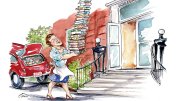1915
Professor Theodore Richards becomes the first American to receive a Nobel Prize in Chemistry.
1925
The Harvard Fund is officially established—to provide a means for alumni to support the University through annual contributions, as distinct from special gifts to a particular drive or campaign.
1940
“A decade ago,” note the editors, “any Harvard man who rode a bicycle was thought at least eccentric.” But “since the universal recognition of carbon monoxide,” bicycles have made a comeback in Cambridge, with more than 250 counted in daily use around the Yard and the Houses.
1955
The Corporation orders the replacement on the Memorial Hall tower of the rooftop railing and other metal ornamentation removed early in 1945 because of deterioration—and unwittingly sets the stage for the conflagration that destroyed all but the base of the tower in 1956.
1970
Surprising students and faculty alike, administrative vice president L. Gard Wiggins announces that the University will buy only lettuce picked by members of the United Farm Workers—a change from its earlier policy of buying solely on the basis of quality, value, and supplies available. The decision ends a sustained effort by a small group of Harvardians to convince the University to boycott lettuce altogether.
1990
Julia Child donates 2,000 cookbooks from her collection to Radcliffe’s Schlesinger Library, with a promise of more to come. The “French chef” hopes the gift will promote cooking as a respected profession and academic field of study.
2000
Moore professor of biological anthropology Irven DeVore delivers his final lecture in Science B-29, “Human Behavioral Biology” (popularly known as “Sex”), which he has co-taught since 1970, attracting close to a third of all undergraduates during that time span with his showmanship and devotion to teaching.
2020
Having lost the first round of its lawsuit against Harvard, Students for Fair Admissions sues the University of North Carolina. The pair of cases ultimately resulted in the 2023 Supreme Court ruling that outlawed consideration of race in admissions.








